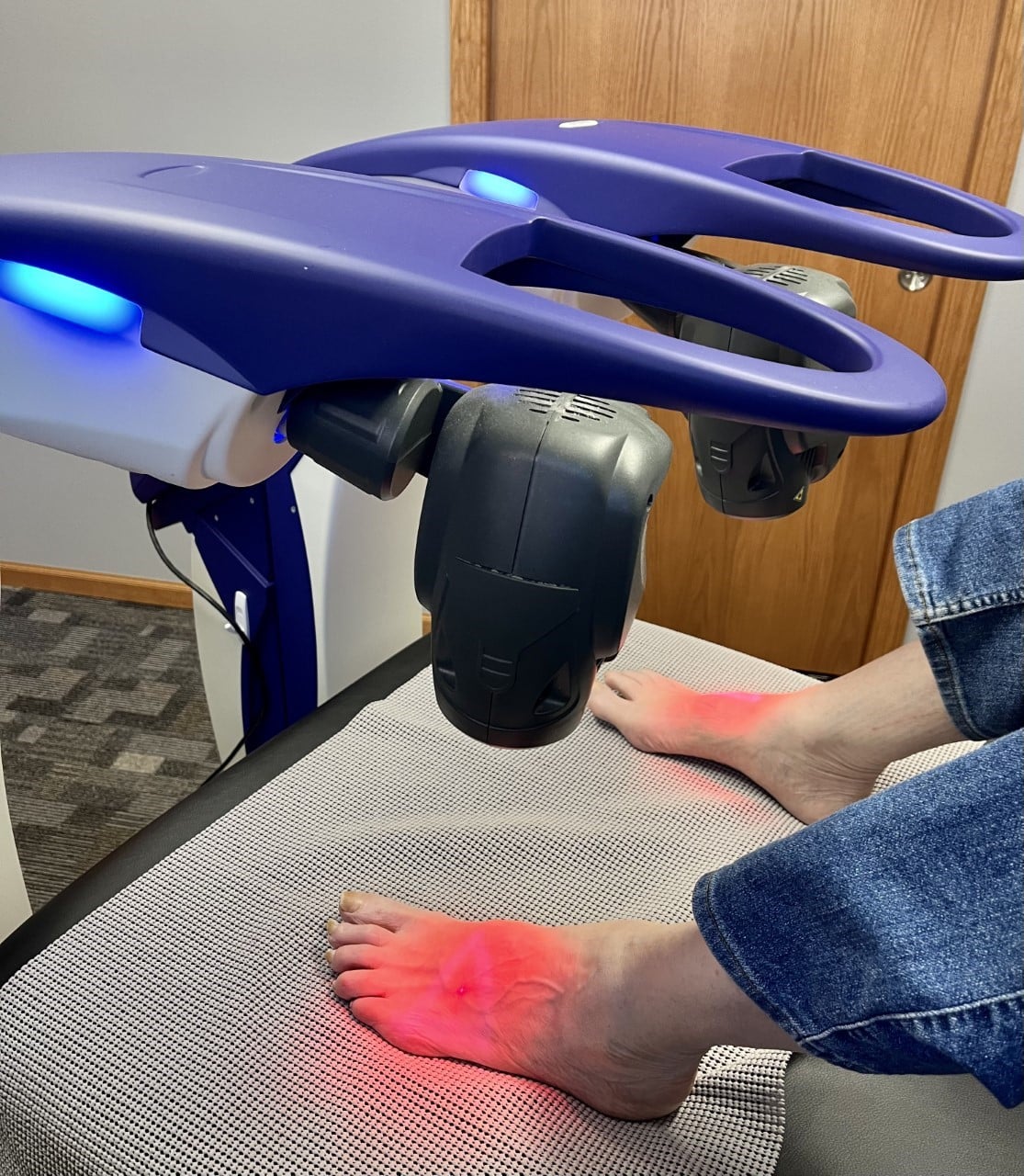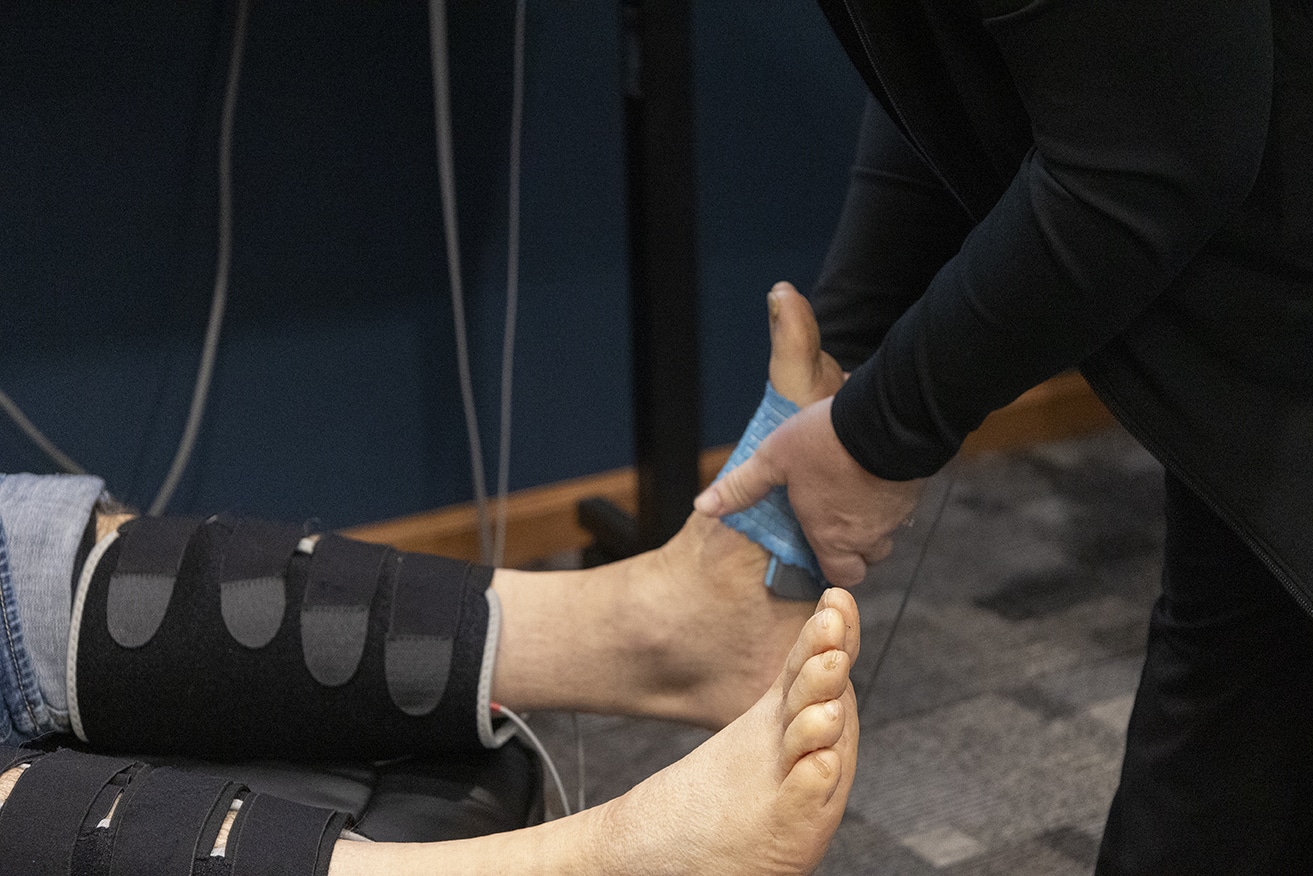This free report was written by Kyle J. Pankonin, DC, DIANM, DACCP, CFMP, CCEP, a board-certified chiropractic orthopedist with more than 25 years of clinical experience treating some of the most challenging pain conditions in the human body, including peripheral neuropathy. In addition to this training, which helps him properly diagnose conditions and offer research-based non-drug and non-surgical treatment options, Dr. Pankonin is also a board-certified functional medicine practitioner. This specialized training helps him find the root cause of almost any health challenge, including peripheral neuropathy.
LIVING WITH PERIPHERAL NEUROPATHY
I want to start this report by addressing the suffering and fears you likely are experiencing if you are living with this tough condition. You may fear falling because you don't have much feeling in your feet. Most people with neuropathy have balance issues. Older patients may be afraid of an accompanying hip or other fracture with these falls, which is a legitimate fear. Those of you with diabetic neuropathy may fear developing ulcers and even possible amputation. Nearly 86,000 Americans each year undergo amputations as a result of uncontrolled neuropathy. The symptoms of neuropathy are life-changing and many people suffer greatly: burning, tingling, pain, loss of balance and difficulty sleeping.
While there are no absolute guarantees in healthcare, for many of you reading this guide there is hope for significant and meaningful improvement to your condition. There are advanced research-based non-drug and non-surgical options now being used throughout the United States. These are options your traditional doctor will not tell you about. There are ways to improve circulation to damaged nerves; to wake them up and lessen pain. Better sleep, less pain, improved balance, and overall better quality of life is possible with many people currently suffering from peripheral neuropathy.
Let’s talk about:
- What causes neuropathy
- How modern medicine addresses this problem
- Different types of neuropathy
- Alternative treatments that work
- How to determine if you are a good candidate for alternative types of treatment
Peripheral neuropathy is a disorder of the peripheral nerves, meaning those outside of the spine, usually the arms or legs. It affects the feet and/or hands, causing weakness, numbness, tingling and pain. Peripheral neuropathy can come and go, slowly progressing over many years, or it can be severe and debilitating. If diagnosed early, it can often be controlled with the right treatment. Neuropathy is really your doctor's word for nerve damage. It is estimated 20 million patients in the U.S. suffer from this diagnosis.
CAUSES
The most common cause of neuropathy by far is diabetes. When glucose (sugar) is too high in the body over a long period of time it can lead to nerve damage and neuropathy. If the damage is not contained it can lead to ulcers and amputation may be necessary. Another common and often overlooked cause of neuropathy is the use of cholesterol (statin) medications. Cholesterol is actually the biggest component of the protective covering surrounding nerves. When you artificially lower cholesterol too much it damages the protective nerve covering and can lead to neuropathy.
Another unfortunate cause of neuropathy is as a side effect of chemotherapy. While chemo may be what was needed to treat the cancer, the toxic effects can also be quite harmful to the nerves. Heavy metal toxicity may be responsible for some neuropathy cases. Overexposure to lead, mercury, aluminum, arsenic, r cadmium, to name a few, can cause damage to the delicate nerves of the body. Nutritional deficiencies of vitamin or micronutrient levels may be to blame, most commonly B12, B6 and B1.
Most other neuropathy cases that do not fall into these categories are termed idopathic, which means a cause cannot be determined. As a functional medicine practitioner, I simply do not believe no cause can be identified. I believe there is always a cause and many times if you find the cause of a condition you find the key to treating it. We also treat many patients with compressive neuropathy, which is caused by conditions like spinal stenosis (narrowing of the spinal canal) or disc bulges or herniation putting pressure on nerves. Carpal tunnel syndrome is a direct compression of a nerve at the wrist so needs to be checked for in patients with hand symptoms.
Finally, one common trait in all peripheral neuropathy cases is INFLAMMATION. If you don't get whatever is causing your inflammation under control, your nerves will never be healed.
SYMPTOMS
The specific symptoms you experience will depend on which parts of the nerve are affected. If the sensory part of the nerve is affected, there will be a loss of sensation or over-sensation of pain, tingling or burning. If the motor part of the nerve is affected, muscle weakness, cramps, spasms, loss of balance and coordination issues will occur. If the autonomic nerves are damaged this can affect involuntary problems (functions you can't control). This can lead to abnormal blood pressure and heart rate, reduced ability to perspire, constipation, bladder dysfunction such as incontinence, and sexual dysfunction. Most patients have a mix of symptoms with different areas of the nerves being affected.
MEDICAL TREATMENT OPTIONS
Most over-the-counter medications like aspirin or ibuprofen do little or nothing to target nerve pain. One drug called Cymbalta has been FDA-approved to treat diabetic neuropathy. Side effects include nausea, dry mouth, sleepiness, fatigue, constipation, loss of appetite and sweating. It can also cause dizziness and hot flashes. The most common medication we see prescribed for non-diabetic neuropathy is Gabapentin (Neurontin) which is an anti-convulsant and is not even FDA-approved to treat neuropathy. Common side effects include dizziness, drowsiness, unsteadiness, memory loss, lack of coordination, difficulty speaking, viral infections and tremors. There are some other medications used on occasion, but the common denominator is none of the are meant to cure neuropathy. Medications will not fix your neuropathy, only mask the symptoms. While medications may offer symptom relief at first, over time this relieving effect will lessen as the underlying condition continues to worsen without any action being taken to actually fix it, not just cover its symptoms.
ALTERNATIVE TREATMENT OPTIONS
There is no one magic bullet cure for treating neuropathy. It takes a comprehensive approach to find and address the cause then correct or at least improve the damage that has occurred.
IN-OFFICE TREATMENTS THAT WORK
- Multiwave Locked System (MLS) Laser Therapy is a class IV laser and is the most powerful available on the market for treating nerve conditions. We are one of the only clinics in SW MN to offer this breakthrough technology and have been using it for more than 10 years. Deep tissue robotic laser therapy penetrates into the nerve cells and stimulates energy production which promotes healing. The laser uses two different wavelengths: one works on pain and one works on inflammation. They are synced together to produce a synergistic effect.
- NeuroMed Electroanalgesia generates an electric current to help stimulate normal nerve firing. It helps to "wake the nerves up," reduce muscle cramping and spasm and inhibits pain signal. At the most basic level, it blocks pain and awakens the nerves to bring back normal feeling. This is very different than basic TENS or electrical stimulation units used at home or in a physical therapy or chiropractic clinic for musculoskeletal pain conditions. These other machines produce stimulation from 1-150 pulses per second. NeuroMed electroanalgesia produces up to 10,000 pulses per second. We are the only clinic in SW MN to offer this advanced form of electrical stimulation.
- Back On Trac/Cervi-Trac and custom orthotics from Foot Levelers may be helpful in some neuropathy cases. We use a specific type of traction which helps to gently stretch the spacing between the vertebrae in the lower back or neck to reduce pressure on pinched nerves. Many patients with foot pain benefit greatly from custom orthotics from Foot Levelers. These gently correct arch collapse which in turn reduces pressure on pinched nerves in the feet. They also help with balance.
- Targeted supplementation containing ingredients that have been proven to help heal nerves in neuropathy patients are prescribed. We use a supplement called Nerve Renew which contains the most powerful and clinically proven forms of B vitamins, stabilized R alpha lipoic acid, anti-oxidants and herbal extracts. All the ingredients have been clinically proven to reduce neuropathy pain and discomfort.
CAN YOU BE HELPED?
A thorough review of your condition and overall health history and a thorough examination is the only way to determine how far your neuropathy condition has progressed and if it can be helped. We will be honest with you. If your condition is too severe, has been present for too long, or if you are unwilling to make changes to follow the program then we will tell you we cannot help. On the other hand, if your history and exam shows us a treatable condition and you are willing to make some changes and follow the program, then we will let you know we likely can help. Clinics around the country with similar programs to ours report a 70-90% success in improving neuropathy symptoms. Our goal is to reduce your symptoms by a minimum of 50% or more. In some severe cases, 50% improvement is a huge success in quality of living, and many patients will see more improvement than that. Total and complete healing is not always attainable, but we have seen several cases achieve well over 50% symptom relief.
ARE YOU READY?
Your options now are to do nothing, continue to do whatever it is you've been doing, or to try this research-backed, comprehensive program. Chances are if you're reading this, you are looking for more answers and other options, and it may be safe to assume what you are currently doing is not working. Remember, peripheral neuropathy is a progressive disease and without proper treatment will continue to worsen over time. Contact us today to schedule an appointment.
Neuropathy Frequently Asked Questions
Take control of your health today!
Schedule your initial consultation with our experienced team now and start your journey towards a pain-free life.


